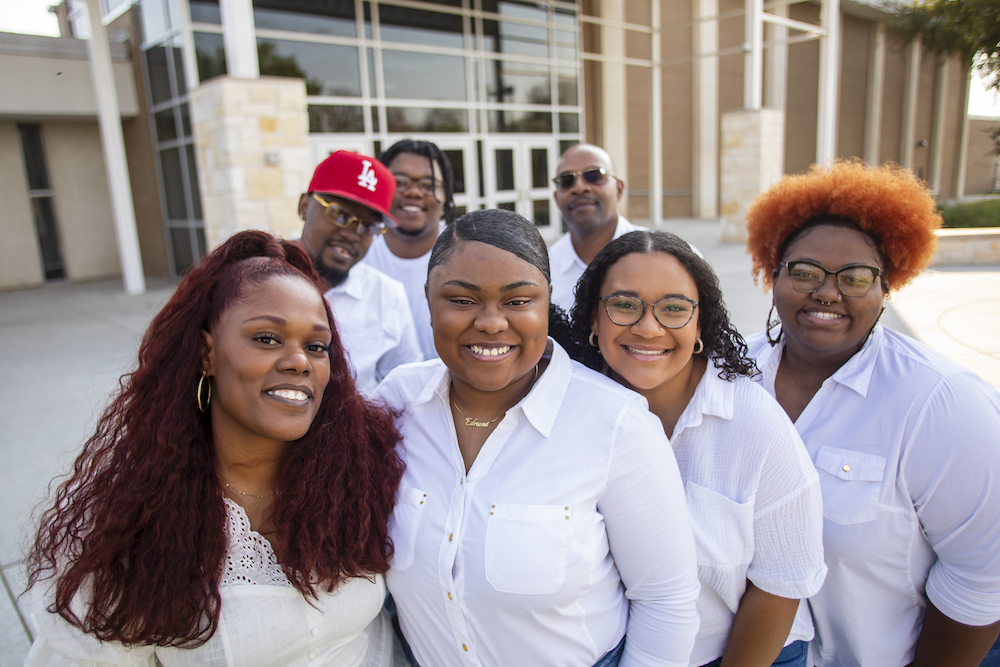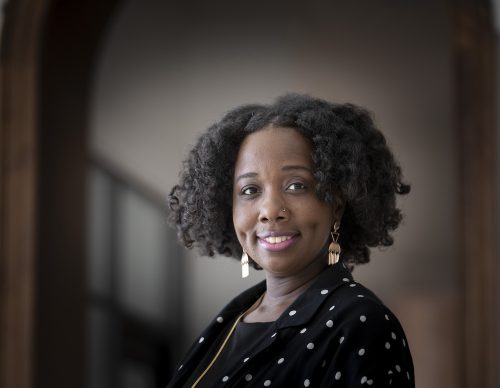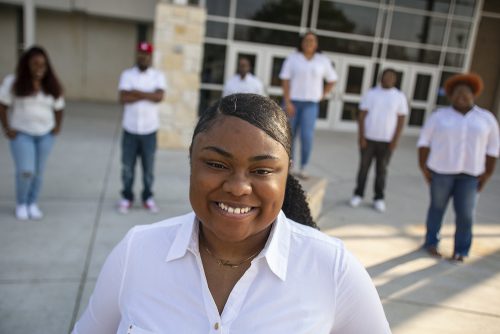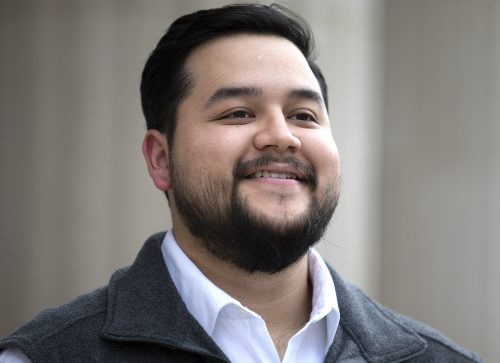
Let There Be Light
First-generation college students succeed with advocacy and the support of community.
I admire the words of civil rights activist Ella Baker: “Give light and people will find the way.”
A passion to uplift others is rooted in my research and in my practice of building pathways for first-generation college students. Advocating for educational opportunity is fundamental to who I am as a person. My parents, family and community gave me light at every stage of my journey. Obtaining a doctorate in higher education leadership at TCU and now using my voice to empower others are possible because of this gift of light.

Whitnee Boyd ’17 EdD is a passionate advocate for first-generation college students. The TCU community has a responsibility to help these students succeed, she says. Photo by Joyce Marshall
While I am not a first-generation college student, I have committed my work to advocating for people who are.
In the Palko Hall office of Cornell Thomas, a former professor of education at TCU, I made the declaration to study first-generation college students. Thomas, my adviser, listened to my passionate tales of serving such students.
I told him about working with students and families in the Morningside community in south Fort Worth through a fellowship intended to build a college-going culture.
I told him stories of bringing kids to tour TCU. I mentioned a girl named Shannon, who upon visiting the Mary Couts Burnett Library shared her love for books and told me she could not wait to go to college.
I told him about working with a student and her mother to help them understand financial aid packages.
He helped me work through frustrations with the roadblocks first-generation college students face — understanding financial aid and housing, utilizing campus resources, growing accustomed to university jargon — while accessing and navigating a university system. He encouraged me to become an advocate for these students’ success.
The value of a bachelor’s degree makes this type of advocacy essential. According to the Association of Public and Land-grant Universities, people who hold a bachelor’s degree will make an average of $1.2 million more in lifetime earnings compared with peers who have a high school diploma.
A college degree shifts the earning potential and social mobility of students and their families for generations to come.
SUCCESS BEGINS ON THIS CAMPUS
First-generation college students are not a homogenous group. Almost 17 percent of current TCU undergraduates identify as the first in their families who expect to obtain a bachelor’s degree. Several top leaders at the institution are first-generation college graduates, including Chancellor Victor J. Boschini, Jr.
About 60 percent of TCU’s first-generation college students identify as people of color. About 34 percent of TCU’s first-generation students are eligible to receive Pell Grants, while only about 13.5 percent of all students are eligible. The federal government awards these grants to people who have exceptional financial need.
The maximum Pell Grant is $6,895 for the 2022-23 academic year. Eligible students need additional financial help to succeed in college. Institutions such as TCU must provide supplemental aid to make education accessible.
Beyond financial assistance, universities must focus on developing the holistic student. They must foster belonging through college readiness programs, mentoring and advising initiatives, and communication campaigns that are relevant to first-generation student experiences.
The majority of these first-generation Horned Frogs hail from Texas — and North Texas specifically. Including them in the TCU community helps the university strengthen connections to its own backyard.
The university is a First-Gen Forward Institution, an honor designated by the Center for First-Generation Student Success. TCU is one of 277 U.S. institutions recognized for this commitment. The designation gives faculty and staff access to a library of best support practices, professional development opportunities and a network of other advocates for first-generation student success.
ADVOCACY THAT AMPLIFIES
From years of working alongside and building community with first-generation college students and their families, I know their stories deserve a voice — one that can share the complexities of their experiences.
Research on first-generation college students tends to center on what they need instead of what they add to college campuses.

“Being a first-generation college student carries a lot of weight in my family,” Edriana Cofer says. “We face obstacles along the way, but when you find your community and resources, you can thrive in college.” Photo by Mark Graham
The data does not tell triumphant success stories like that of Edriana Cofer, a first-generation college student and senior education major. She said TCU’s Community Scholars program and staff mentors across campus helped her navigate college and become a leader. Cofer now serves as president of Alpha Kappa Alpha Sorority and vice president of the Black Student Association and is a mentor to younger students.
The tenacity first-generation students display when in a supportive community shows how they can enrich a campus, their community and all those they encounter in the future. “When I first started college, I wanted to go into the medical field because I was focused on how I could make a lot of money and be financially stable,” Cofer said. “Over time, I realized that I wanted to do something I enjoy, and for me that is education and building a path to becoming a principal.”
Now I advocate for students like Cofer by using my voice, time, resources and professional network.
I have served as the chair of the advocacy group for the national Center for First-generation Student Success.
I have gone to the passport office with a student and his family to ensure he had his clearance to attend Frog Camp in Scotland.
I have spent time in churches, community centers, restaurants and more helping students revise essays for scholarship applications.
I have talked with countless students about how to choose a graduate school program. I have reviewed offer letters for a first job.
When supporting the student, I am also supporting the family.
“Being a first-generation college student carries a lot of weight in my family,” Cofer said. “We face obstacles along the way, but when you find your community and resources, you can thrive in college. Being a senior, I am confident in being prepared to be an educator.”
Faculty and staff are key components to the success of first-generation students. Tyler Grijalva ’20 (MBA ’22) was a Chancellor’s Scholar and student assistant in the chancellor’s office throughout his undergraduate years. “Working on campus and knowing that I had people who cared about my well-being was crucial,” he said.
People across TCU’s campus are building the necessary systems for holistic student support.
Cynthia Montes ’05 (MEd ’11, PhD ’22) oversees the Student Support Services program at TCU, which provides a range of personal and academic resources for many of the university’s first-generation college students. “Advocacy is the willingness to procure resources,” said the first-generation college graduate and recent Chancellor’s Staff Award winner.
The need for those resources is growing at TCU. Between the fall 2019 and fall 2021 semesters, the university added 408 first-generation students — a growth of more than 32 percent in this population in just two years.
“We have created a shift in the culture,” Montes said, “and need to continue this work.”
A growing number of intervention programs are also helping build a college-going culture among area high school students.
TCU is home to a chapter of the national College Advising Corps. The program relies on recent college graduates to serve in schools across Tarrant County and help support students with college and career readiness.
Grijalva, who majored in political science at TCU, found a path to advocacy while serving as a college adviser at Fort Worth’s Diamond Hill-Jarvis High School. “When we advocate for the student,” he said, “we have to advocate in their best interest, not our idea of what their best interest should be. Support is then connecting people to resources, even if you yourself are the resource.”
The College Advising Corps expanded to 64 advisers for the 2021-22 year, made possible by a grant from the Rainwater Charitable Foundation, which also helped create the Tarrant To & Through Partnership.
A SENSE OF BELONGING
The biggest cheerleaders for first-generation college students are often those they have known throughout their lives, such as family members, friends, neighbors, teachers and mentors.
“It’s been helpful that my immediate family is very supportive,” Cofer said. “No matter what route I wanted to go, they support me. I also stay in touch with my teachers at Dunbar High School who mentor me on my path to becoming an educator.”
After students enroll, institutions of higher education are responsible for ensuring they can find a path and a place in the campus community.
Cofer said being part of a college community means “connecting with people that make you feel like you are at home and that you can be yourself around.”

“Having people who checked on me, got to know me and showed a genuine concern for me was priceless,” says Tyler Grijalva ’20 (MBA ’22). “It helped me to become more comfortable asking questions about things I did not know. I took that same care to the students I worked with.” Photo by Joyce Marshall
To build academic community, TCU offers federal TRIO programs, which include Upward Bound as well as Student Support Services and the Ronald E. McNair Post-Baccalaureate Achievement Program. These efforts are designed to provide equitable college opportunities.
Montes said she is committed to being the supportive type of person she found during her student years. “There were multiple times when administrators at TCU would ensure I had what I needed financially and academically because they saw that I was working to be my best academic self while balancing jobs and being involved in student organizations.”
We as individuals connected to the TCU community also have a responsibility to help ensure the success of first-generation college students. Every bit of support helps.
“Having people who checked on me, got to know me and showed a genuine concern for me was priceless,” Grijalva said. “It helped me to become more comfortable asking questions about things I did not know. I took that same care to the students I worked with.”
Grijalva now works for Boeing as a supply chain specialist. He said his success at TCU has been a driver for his younger siblings. “You think you are all alone at times and then you realize, ‘I’m not the first person to do this, and I will not be the last person.’ My younger brother and sister can now know that college is possible, and they have me as a resource.”
He plans to mentor younger first-generation and Latinx students at TCU as well. “I want them to see people who look like them working at places like Boeing. I want to be a resource who can hopefully create internship and job opportunities for them.”
The opportunity to give light to others is often an intrinsic motivation for first-generation college students, Montes said. “I did not get here alone, and I must pay it forward. I have had God, my mom, family, professors and others pour into me. As a first-generation college student, it is often hard to see myself in certain spaces. We must let students know they belong here.”
Ella Baker understood the power of using what we possess to contribute to the greater good. Giving light may mean contributing to a scholarship program, serving as a mentor or investing in someone’s career.
Whatever the method, I hope you will commit to helping first-generation college students and other marginalized students succeed. As members of the Horned Frog community, let’s work to give light to others by creating opportunities that will illuminate their paths.

Cynthia Montes ’05 (MEd ’11, PhD ’22), center in purple and black, oversees the Student Support Services program at TCU. Courtesy of Cynthia Montes

Your comments are welcome
Comments
Related reading:
Features
College Advising Corps Guides High School Students
The goal of TCU’s College Advising Corps is to make college a reality for all high school students.
Features
Community Scholars Bring New Perspectives
Scholarship program opens up a world of possibilities to North Texas’s underserved elite students.